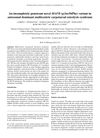May 2023 in “Pharmaceuticals” Three specific mutations in the LIPH gene can cause hair loss by damaging the protein's structure and function.
 157 citations,
May 2021 in “Endocrine Reviews”
157 citations,
May 2021 in “Endocrine Reviews” Early diagnosis and individualized treatment improve outcomes for Congenital Adrenal Hyperplasia.
 23 citations,
February 2020 in “PLOS genetics”
23 citations,
February 2020 in “PLOS genetics” Mice with LSS deficiency showed hair loss and cataracts, similar to humans, and can help in understanding and treating this condition.
21 citations,
March 2018 in “American Journal Of Pathology” Mutations in NIPAL4 cause skin issues by disrupting lipid layers, but some improvement is seen with topical treatment.
1 citations,
July 2021 in “IntechOpen eBooks” Environmental factors can cause mutations in skin proteins, leading to skin disorders.
 May 2024 in “Frontiers in medicine”
May 2024 in “Frontiers in medicine” A genetic mutation in the LIPH gene causes tightly curled hair that stops growing in some Japanese individuals.
 January 2022 in “IntechOpen eBooks”
January 2022 in “IntechOpen eBooks” Some lesser-known causes of PCOS include autoimmune issues, genetic mutations, and changes in the body's microbiome.
 33 citations,
March 2006 in “Seminars in cutaneous medicine and surgery”
33 citations,
March 2006 in “Seminars in cutaneous medicine and surgery” The document explains how to identify different hair problems using a microscope.
 5 citations,
November 2021 in “Saudi medical journal”
5 citations,
November 2021 in “Saudi medical journal” The document reports three sisters with Woodhouse-Sakati syndrome showing typical symptoms and unusual gynecological anomalies.
2 citations,
January 2022 in “The Application of Clinical Genetics” A young Russian girl with Meier-Gorlin syndrome has two new mutations in the CDC6 gene.
 65 citations,
February 2009 in “The journal of investigative dermatology/Journal of investigative dermatology”
65 citations,
February 2009 in “The journal of investigative dermatology/Journal of investigative dermatology” Anti-acne medications may work by reducing the activity of a protein involved in acne development.
 27 citations,
April 1996 in “Baillière's clinical endocrinology and metabolism”
27 citations,
April 1996 in “Baillière's clinical endocrinology and metabolism” The document says that understanding the causes of PCOS is important for treatment, especially in distinguishing the syndrome from just having cystic ovaries, and that losing weight is key for obese women with PCOS.
 April 2017 in “Journal of Investigative Dermatology”
April 2017 in “Journal of Investigative Dermatology” Targeted siRNA therapy may be a promising treatment for KID syndrome by reducing mutant gene expression and improving cell communication.
 January 2016 in “SpringerBriefs in bioengineering”
January 2016 in “SpringerBriefs in bioengineering” Genetic defects and UV radiation cause skin damage and aging.
 87 citations,
March 2014 in “Biochimica et Biophysica Acta (BBA) - Molecular and Cell Biology of Lipids”
87 citations,
March 2014 in “Biochimica et Biophysica Acta (BBA) - Molecular and Cell Biology of Lipids” Cholesterol sulfate buildup due to a genetic mutation disrupts the skin barrier, leading to the scaling skin seen in X-linked ichthyosis.
 64 citations,
August 2014 in “The journal of allergy and clinical immunology/Journal of allergy and clinical immunology/The journal of allergy and clinical immunology”
64 citations,
August 2014 in “The journal of allergy and clinical immunology/Journal of allergy and clinical immunology/The journal of allergy and clinical immunology” A deficiency in the TTC7A gene causes immune problems, gut issues, and hair loss.
 53 citations,
April 2018 in “Journal of The American Academy of Dermatology”
53 citations,
April 2018 in “Journal of The American Academy of Dermatology” Cancer treatments often cause hair disorders, significantly affecting patients' quality of life, and better management methods are needed.
 20 citations,
May 2013 in “International Journal of Molecular Medicine”
20 citations,
May 2013 in “International Journal of Molecular Medicine” Researchers found a new gene variant linked to a rare bone disease, which doesn't always cause symptoms in carriers.
 1 citations,
January 2022 in “Research Square (Research Square)”
1 citations,
January 2022 in “Research Square (Research Square)” CRISPR/Cas9 editing in spinach affects root hair growth by altering specific genes.
 April 2017 in “Journal of Investigative Dermatology”
April 2017 in “Journal of Investigative Dermatology” Deep phenotyping helps distinguish between xeroderma pigmentosum and trichothiodystrophy, aiding in diagnosis and treatment.
 199 citations,
April 2010 in “Nature”
199 citations,
April 2010 in “Nature” A gene called APCDD1, which controls hair growth, is found to be faulty in a type of hair loss called hereditary hypotrichosis simplex.
 144 citations,
August 2019 in “Cells”
144 citations,
August 2019 in “Cells” The WNT signaling pathway is important in many diseases and targeting it could offer new treatments.
 125 citations,
September 2019 in “Journal of Clinical Immunology”
125 citations,
September 2019 in “Journal of Clinical Immunology” Foxp3 is crucial for regulatory T cell function, and targeting these cells may help treat immune disorders.
 122 citations,
November 2010 in “Journal of Dermatological Science”
122 citations,
November 2010 in “Journal of Dermatological Science” Male pattern baldness involves hormones and cell signals affecting hair growth.
 70 citations,
October 2020 in “The journal of allergy and clinical immunology/Journal of allergy and clinical immunology/The journal of allergy and clinical immunology”
70 citations,
October 2020 in “The journal of allergy and clinical immunology/Journal of allergy and clinical immunology/The journal of allergy and clinical immunology” Janus kinase inhibitors are promising drugs for treating autoimmune and inflammatory diseases.
 65 citations,
September 2010 in “Journal of the Neurological Sciences”
65 citations,
September 2010 in “Journal of the Neurological Sciences” Kennedy's disease leads to muscle weakness and sensory issues, has no cure but manageable symptoms, and future treatments look promising.
 60 citations,
September 2015 in “Expert Review of Clinical Immunology”
60 citations,
September 2015 in “Expert Review of Clinical Immunology” Lymphocytes, especially CD8+ T cells, play a key role in causing alopecia areata, and targeting them may lead to new treatments.
 53 citations,
June 2012 in “Annales d'Endocrinologie”
53 citations,
June 2012 in “Annales d'Endocrinologie” The document concludes that recognizing and properly diagnosing lipodystrophy syndromes is crucial for effective management and treatment.
 25 citations,
December 2005 in “Molecular Genetics and Metabolism”
25 citations,
December 2005 in “Molecular Genetics and Metabolism” Taking riboflavin and eating less lysine can help some people with a specific genetic disorder avoid brain damage.
 23 citations,
November 2001 in “Archives of Dermatology”
23 citations,
November 2001 in “Archives of Dermatology” Genetic discoveries are key for understanding, diagnosing, and treating inherited hair and nail disorders.

























